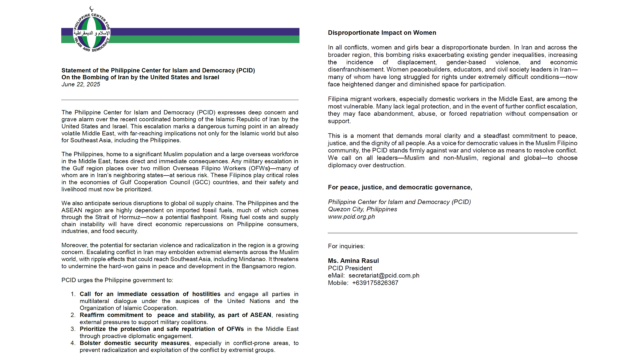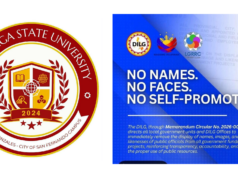The Philippine Center for Islam and Democracy (PCID) expresses deep concern and grave alarm over the recent coordinated bombing of the Islamic Republic of Iran by the United States and Israel. This escalation marks a dangerous turning point in an already volatile Middle East, with far-reaching implications not only for the Islamic world but also for Southeast Asia, including the Philippines.
The Philippines, home to a significant Muslim population and a large overseas workforce in the Middle East, faces direct and immediate consequences. Any military escalation in the Gulf region places over two million Overseas Filipino Workers (OFWs)—many of whom are in Iran’s neighboring states—at serious risk. These Filipinos play critical roles in the economies of Gulf Cooperation Council (GCC) countries, and their safety and livelihood must now be prioritized.
We also anticipate serious disruptions to global oil supply chains. The Philippines and the ASEAN region are highly dependent on imported fossil fuels, much of which comes through the Strait of Hormuz—now a potential flashpoint. Rising fuel costs and supply chain instability will have direct economic repercussions on Philippine consumers, industries, and food security.
Moreover, the potential for sectarian violence and radicalization in the region is a growing concern. Escalating conflict in Iran may embolden extremist elements across the Muslim world, with ripple effects that could reach Southeast Asia, including Mindanao. It threatens to undermine the hard-won gains in peace and development in the Bangsamoro region.
PCID urges the Philippine government to:
- Call for an immediate cessation of hostilities and engage all parties in multilateral dialogue under the auspices of the United Nations and the Organization of Islamic Cooperation.
- Reaffirm commitment to peace and stability, as part of ASEAN, resisting external pressures to support military coalitions.
- Prioritize the protection and safe repatriation of OFWs in the Middle East through proactive diplomatic engagement.
- Bolster domestic security measures, especially in conflict-prone areas, to prevent radicalization and exploitation of the conflict by extremist groups.
Disproportionate Impact on Women
In all conflicts, women and girls bear a disproportionate burden. In Iran and across the broader region, this bombing risks exacerbating existing gender inequalities, increasing the incidence of displacement, gender-based violence, and economic disenfranchisement. Women peacebuilders, educators, and civil society leaders in Iran— many of whom have long struggled for rights under extremely difficult conditions—now face heightened danger and diminished space for participation.
Filipina migrant workers, especially domestic workers in the Middle East, are among the most vulnerable. Many lack legal protection, and in the event of further conflict escalation, they may face abandonment, abuse, or forced repatriation without compensation or support.
This is a moment that demands moral clarity and a steadfast commitment to peace, justice, and the dignity of all people. As a voice for democratic values in the Muslim Filipino community, the PCID stands firmly against war and violence as means to resolve conflict. We call on all leaders—Muslim and non-Muslim, regional and global—to choose diplomacy over destruction.
For peace, justice, and democratic governance,
Philippine Center for Islam and Democracy (PCID)
Quezon City, Philippines
www.pcid.org.ph
For inquiries:
Ms. Amina Rasul
PCID President
eMail: secretariat@pcid.com.ph
Mobile: +639175826367





